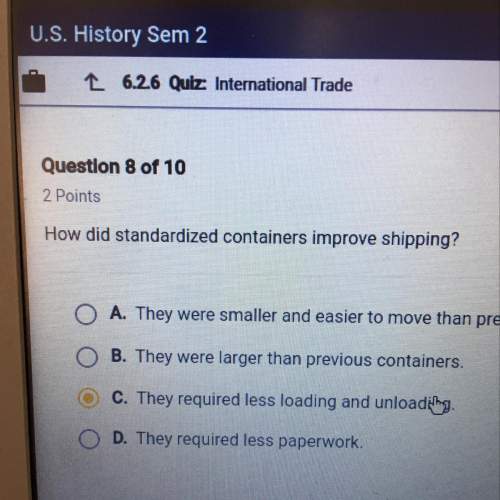
History, 26.11.2020 06:10 youngsunc02
Question 1: Which of these contributed to the rise of the "Great War"?
a. German-Russian Alliance
b. The end of the Triple Entente
c. Decrease in unilateral negotiations
d. Nationalistic rivalries that stoked tensions
Question 2 : Who were the "Bolsheviks"?
a. Left-wing insurgents that seized power and removed Russia from World War I
b. Marxist Revolutionaries who wanted to reorganize Eastern Europe after World War c. Russians who opposed the Brest-Litovsk Treaty
d. Anti-Materialist soldiers who revolted
Question 3 : What was the Great Depression?
a. A stock market collapse because of the German defeat in World War I
b. Decrease in economic trust in the Federal Reserve
c. An American financial collapse in 1928
d. A global economic downturn that followed the Roaring 20s
Question 4 : Which one of these was no an authoritarian regime?
a. French Empire
b. Communist Russia
c. Imperialist Japan
d. Fascist Germany
Question 5: What was one of the efforts made by The United States to counteract Soviet influence in post-World War II Europe?
a. The Truman Financial Apparatus
b. North Atlantic Treaty Organization
c. Balkan War
d. Berlin Airdrop
Question 6: Africa in the 1940s:
a. Growth of Christianity in South Africa
b. Decrease in Communist influence
c. Began to see nationalistic movements grow
d. Ascension of British interventions
Question 7: Post WWII decolonization and the rise of the Cold War led to:
a. Decline of the World Bank
b. Tensions in the United States over Hungarian Revolt
c. The decrease in nuclear armaments
d. The three world system
Question 8: The First World War broke apart:
a. Ottoman Empire
b. Tsarist Russia
c. Triple Entente
d. All of the above
Question 9: What were the Soviet Union's "Five Year Plans"?
a. Stalinist extermination plans
b. A effort to expand Russian borders
c. An aggressive effort to try to match capitalist production
d. Cyclical changes to increase agrarianism
Question 10: Hitler's 25 Points in 1920 was a mixture of:
a. Anti-Semitism and Anti-manorialism
b. Weimar Republic policies
c. Nationalism and Anti-capitalism
d. Communism
Question 11: The 1920s saw the rise of:
a. Television
b. Racism
c. Mass culture
d. Submarines
Question 12 : World War I was defined by:
a. Trench warfare
b. Short battles
c. Tank warfare
d. Three fronts
Question 13: Who was the driving force in defeating the Japanese Empire in World War II?
a. Soviet Union
b. The United States
c. China
d. Great Britain
Question 14: Why was the Korean War emblematic of the Cold War as a whole?
a. Increase in riots over access to food and medicine that was promised by Soviet or American allies
b. It showed deep racial and philosophical tensions that grew after World War II
c. It was a fight between Communism and Democracy in which the United States and the Soviet Union were involved
d. Demise of diplomacy
Question 15: Which country had a civil war, and which country gained independence without insurrection?
a. Italy, Hungary
b. South Korea, Japan
c. Egypt, Germany
d. China, India

Answers: 3


Another question on History

History, 21.06.2019 17:30
Which statement describes the influence of elizabeth i on england? a. her great inherited wealth made requesting funds from parliament rarely necessary, which minimized conflicts. b.her skillful use of personal advisers to communicate her wishes to parliament promoted stability. c.her clever secret diplomacy and many successful wars made her popular with the english people. d.her continuing support of english explorers in the americas brought in vast supplies of silver and gold.
Answers: 3

History, 21.06.2019 20:00
Brainliesttt asap!me : ) which of the following is not an example of cultural diffusion? a latin dance craze in canada a french pastry from a bakery in paris an indian restaurant in england a baseball game in japan
Answers: 1

History, 21.06.2019 23:00
List five people who saw the risen lord jesus. a. b. c. d. e.
Answers: 1

History, 22.06.2019 12:00
African crossing the delaware on christmas night,1776, washington and his troops were victorious in which two battles
Answers: 1
You know the right answer?
Question 1: Which of these contributed to the rise of the "Great War"?
a. German-Russian Alliance <...
Questions


Social Studies, 17.10.2019 19:00



Biology, 17.10.2019 19:00



Physics, 17.10.2019 19:00




Mathematics, 17.10.2019 19:00

Mathematics, 17.10.2019 19:00

Mathematics, 17.10.2019 19:00


Social Studies, 17.10.2019 19:00

Mathematics, 17.10.2019 19:00

History, 17.10.2019 19:00


English, 17.10.2019 19:00




